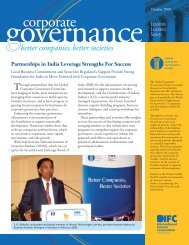SME Finance Policy Guide
SME Finance Policy Guide
SME Finance Policy Guide
You also want an ePaper? Increase the reach of your titles
YUMPU automatically turns print PDFs into web optimized ePapers that Google loves.
G-20 <strong>SME</strong> FINANCE POLICY GUIDE<br />
77<br />
Accounting and Auditing Standards<br />
for <strong>SME</strong>s<br />
The lack of transparency of <strong>SME</strong> accounting and<br />
financial statements makes them risky borrowers and<br />
thus less attractive to lenders. Capacity building of<br />
<strong>SME</strong>s in terms of preparing financial statements and<br />
business plans, as well as improving their financial<br />
literacy and management training, may have a positive<br />
impact on <strong>SME</strong> development. Care should be<br />
taken in applying rigid and potentially harmful<br />
reporting standards to smaller enterprises, which<br />
could be counter-productive.<br />
A clear case can be made in favor of simplified<br />
accounting and financial reporting framework for<br />
smaller enterprises, with requirements commensurate<br />
with their size, the types of transactions they<br />
conduct, and their limited range of stakeholders. A<br />
“one-size-fits-all” approach to financial reporting and<br />
auditing requirements ignores the capacity constraints<br />
that <strong>SME</strong>s face and unnecessarily increases<br />
the cost of doing business for those enterprises,<br />
which generally drive economic growth. In addition,<br />
by increasing the requirements for <strong>SME</strong>s, governments<br />
may create disincentives for businesses to<br />
operate in the formal sector. A holistic approach<br />
would take into account <strong>SME</strong>s’ need for relief from<br />
excessive accounting and auditing requirements, as<br />
well as their need for more time to implement appropriate<br />
standards effectively.<br />
While increased transparency for <strong>SME</strong>s is central to<br />
improving access to bank financing, improved financial<br />
infrastructure (for example, credit information<br />
systems) can be effective in improving transparency.<br />
Rigidly applying IFRS in LDC’s, including even the<br />
tailored “IFRS for <strong>SME</strong>s,” could reduce rather than<br />
promote economic activity by these enterprises, and<br />
have negative implications for growth.<br />
D.3 Public Sector Interventions<br />
Governments can address market failures and incomplete<br />
markets that inhibit the provision of adequate financing<br />
for <strong>SME</strong>s. Government measures to promote <strong>SME</strong>s should<br />
be carefully focused, aiming at making markets work<br />
efficiently and at providing incentives for the private<br />
sector to assume an active role in <strong>SME</strong> finance. LDC governments<br />
are relatively more fiscally and capacity constrained,<br />
and the potential for direct public sector<br />
interventions is more limited, without donor assistance.<br />
State Banks<br />
For state-owned banks to play a positive and complementary<br />
role in the provision of credit to <strong>SME</strong>s, the<br />
following have proven to be pre-requisites:<br />
• Legislation specifying clear mandates (to deflect<br />
political interference);<br />
• Sound governance structures with independent<br />
boards;<br />
• Clear performance criteria;<br />
• The obligation to price loans according to risk, and<br />
to generate a positive return; and<br />
• The ability to recruit and retain qualified staff.<br />
Apexes and Other Wholesale Funding<br />
Facilities<br />
Second-tier funding facilities, or apexes, can be set up<br />
to manage and on-lend funds to financial institutions,<br />
and to accelerate the growth of sound <strong>SME</strong> retail capacity<br />
in order to expand access to finance. Preconditions<br />
for successful application of this model include:<br />
• Define the apex mission and objectives clearly with a<br />
focus on building strong, sustainable, and responsible<br />
financial institutions and <strong>SME</strong>s, not loan disbursements<br />
and outreach.<br />
• Focus on putting in place good governance, capable<br />
management, and an appropriate organizational




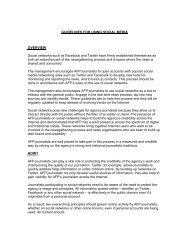

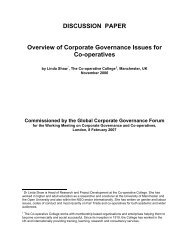
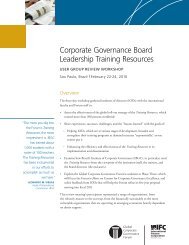




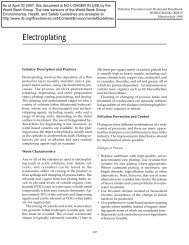

![Print a two-page fact sheet on this project [PDF] - IFC](https://img.yumpu.com/43449799/1/190x245/print-a-two-page-fact-sheet-on-this-project-pdf-ifc.jpg?quality=85)

